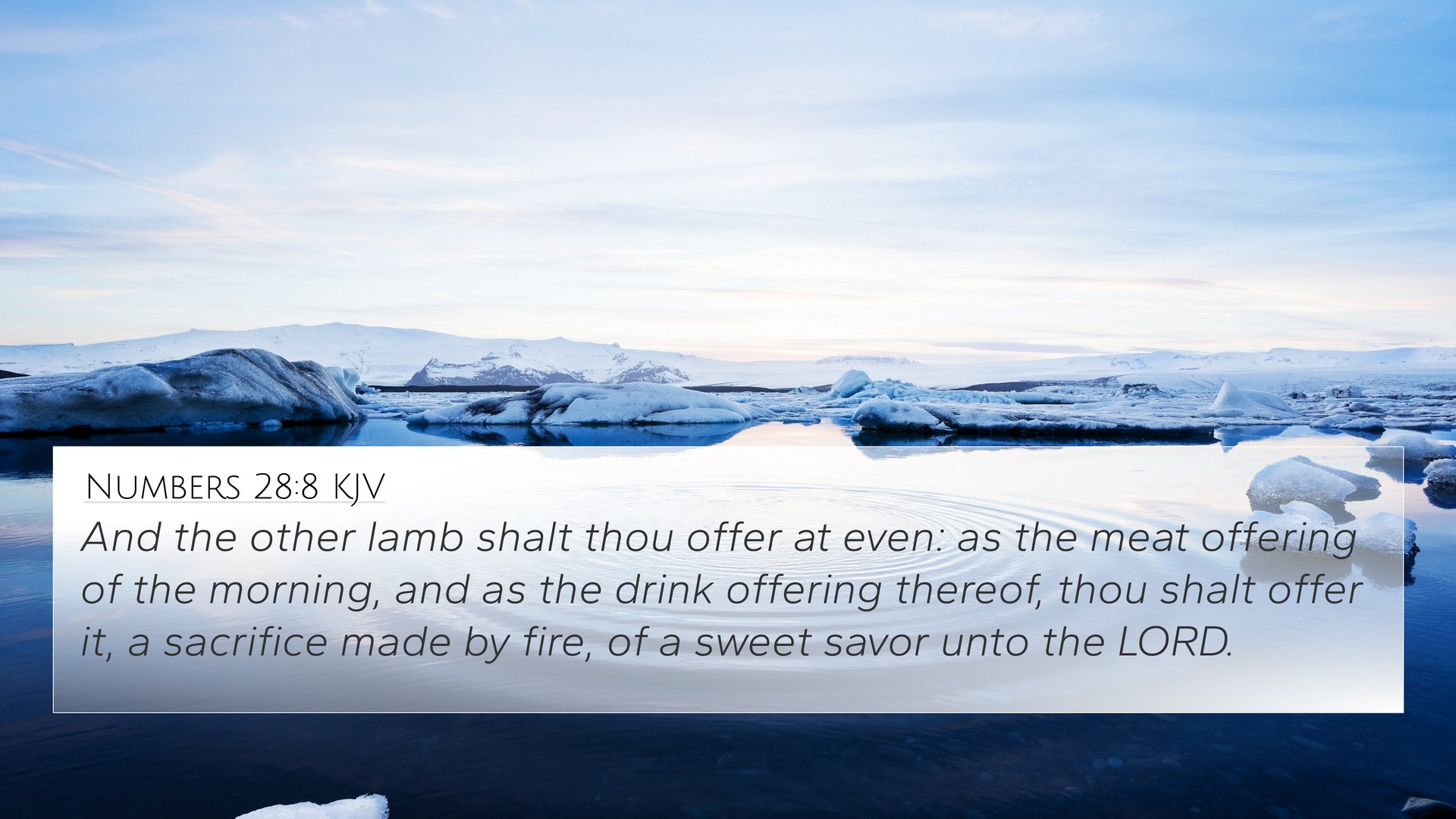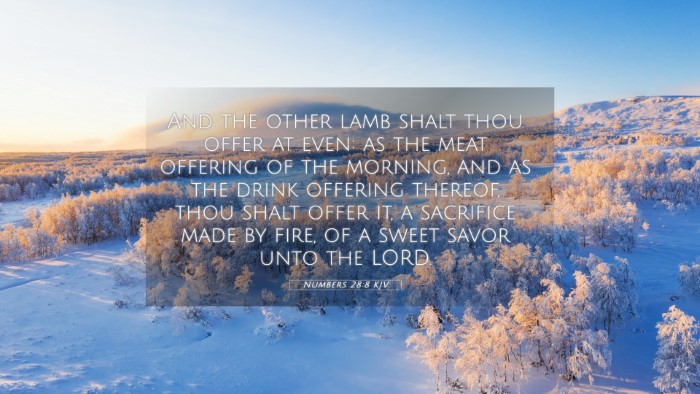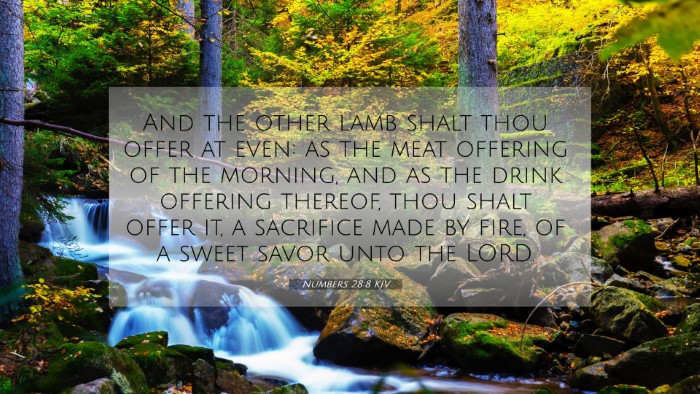Understanding Numbers 28:8
Verse Context: Numbers 28:8 states, "And on the Sabbath day, two lambs of the first year without spot, and two tenth deals of flour for a meat offering, mingled with oil, and the drink offering thereof." This verse is part of a series of instructions given by God to the Israelites concerning the offerings to be made in the temple.
Summary of Meaning: This verse emphasizes the significance of the Sabbath in Jewish worship, highlighting the requirement for specific offerings to be made as an act of devotion and commitment to God. The Sabbath, being a day of rest and reflection, is marked by the bringing of offerings that symbolize purity and the people's need for God’s providence.
Commentary Insights
Matthew Henry's Commentary
Matthew Henry elucidates the importance of the Sabbath as a day set apart from the routine labors of the week, stressing that the offerings presented were to be of the highest quality—a reflection of the people’s reverence for God. He notes that the consistency in offerings reinforces the need for continuous remembrance of God’s provision and grace.
Albert Barnes' Notes
Albert Barnes focuses on the symbolism behind the lambs, which represent innocence and sacrifice. The prescribed offerings on the Sabbath are seen as a community's way to acknowledge their dependency on God. Barnes emphasizes the connection between the offerings and the broader themes of worship and covenant relationship between God and His people.
Adam Clarke's Commentary
Adam Clarke discusses the significance of the Sabbath as a symbol of spiritual rest. He notes that the offerings were a way to express gratitude and invoke divine favor for the week ahead. Clarke also hints at the transitional themes that the ritual of calming one’s labor for a day speaks to—drawing parallels with New Testament practices and teachings on rest in Jesus.
Bible Verse Cross-References
This verse connects with several other Biblical texts that highlight the themes of offerings, the Sabbath, and covenant relationships. Here are some relevant cross-references:
- Exodus 20:8-11: Discusses the commandment to remember the Sabbath day and keep it holy.
- Leviticus 23:3: Details the Sabbath as a day of rest for the people.
- Hebrews 4:9-10: Refers to the rest that remains for the people of God, connecting to the spiritual symbolism of the Sabbath.
- Matthew 12:8: Jesus declares Himself as Lord of the Sabbath, signifying the transformation of the understanding of rest in God.
- Romans 12:1: Urges believers to present their bodies as living sacrifices, drawing a parallel to the sacrificial nature of the offerings.
- 1 Peter 2:5: Points to the idea of spiritual sacrifices acceptable to God, building on the themes found in Numbers.
- Isaiah 58:13-14: Highlights the blessings associated with observing the Sabbath, linking it back to divine favor.
- Colossians 2:16-17: Discusses the shadows of the Old Covenant versus the realization in Christ, portraying the ultimate fulfillment of these offerings.
- Psalm 92:1-2: A psalm for the Sabbath that speaks to rejoicing and reflecting on God’s greatness, aligning with the sacrificial practices.
- Luke 6:5: Further illustrating Jesus' authority over the Sabbath and its laws, emphasizing a heart of worship over ritual.
Thematic Connections
The thematic connections between Numbers 28:8 and other scriptures provide a rich tapestry of understanding for the modern reader. It reinforces the idea of renewal, gratitude, and dedication in a believer’s life.
Practical Applications
For readers today, the lessons from Numbers 28:8 encourage a lifestyle of offering—be it in the form of worship, service, or spiritual discipline. Here are some practical applications:
- Regular Worship: Incorporate regular periods of worship and reflection into your life as you honor God similarly to the Israelites.
- Sabbath Rest: Make it a priority to find your own day of rest, dedicating time to commune with God and reflect on His provision.
- Quality Offerings: Reflect on what you bring before God. Ensure that what you offer—be it time, resources, or service—is your best.
- Community Worship: Engage with your church community in offering praises and sacrifices of gratitude.
- Embrace Spiritual Sacrifices: Find ways to express your faith through acts of kindness, justice, and compassion, echoing the sacrificial themes in Numbers.
Conclusion
Numbers 28:8, with its outlined offerings for the Sabbath, serves as a powerful reminder of the depth of worship required by God’s people. Drawing on insights from established commentators brings a rich understanding of its implications and applications. This verse not only connects with the practices of ancient Israel but also resonates within contemporary faith contexts, encouraging believers to offer their best in worship and observe rest in the Lord.


